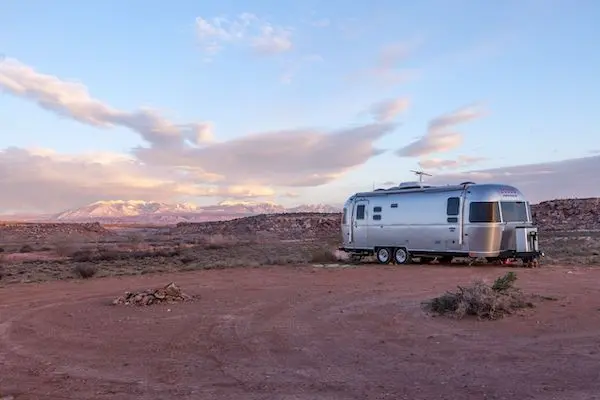
The Ultimate Guide to Towing a Camper Trailer Tent
July 23, 2022
Whether you're towing a traditional camper trailer tent, an off-road camper trailer, a teardrop trailer, or any other form of a home-away-from-home-on wheels, there's a lot to take into consideration to ensure your trip is safe, fun, and properly stocked for every adventure. That's why we at Weather Route have compiled this complete guide to towing a camper / caravan behind your vehicle!
Types of Trailers / Caravans
Off Road Camper Trailer
An off road camper trailer is built with the serious adventure in mind. These lightweight-yet-sturdy trailers offer adventurers a hardy way to enjoy their camping off the beaten path.
Teardrop Trailer Camper
A teardrop trailer is a small, lightweight camper that is easy to tow and maneuver. These campers are perfect for couples or solo travelers who want to enjoy the outdoors without all the hassle of a larger RV.
Camper Trailer Tent
A trailer tent is a hybrid between a traditional tent and a camper trailer. These units are typically lighter weight and easier to tow than a full camper trailer, but offer more amenities than a standard tent, such as a kitchen and dining area. Sometimes known as a pop up camper, these are a light-weight option that can be towed behind most vehicles. These campers are easy to set up and take down, and are perfect for those who want to enjoy the outdoors without all the hassle of a larger RV.
Cargo Trailer Camper
A cargo trailer camper is a camper that is built inside of a standard cargo trailer. These campers are perfect for those who want the security and storage space of a trailer, but also want the ability to camp off the grid.
Mini Trailer Camper
A mini trailer camper is a small, lightweight camper that is easy to tow and maneuver. These campers are perfect for couples or solo travelers who want to enjoy the outdoors without all the hassle of a larger RV.
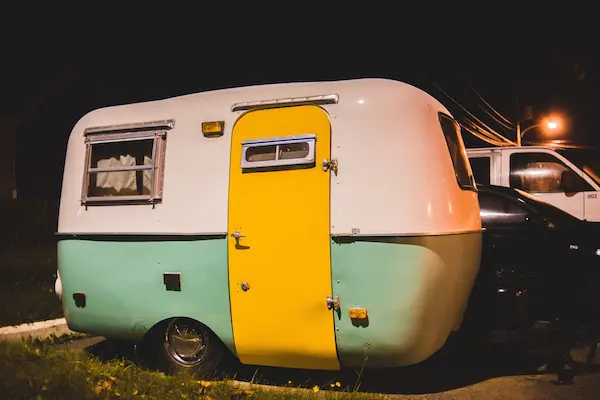
5th Wheel Trailer
A fifth wheel trailer is a large, heavy duty RV that is towed behind a pickup truck. These RVs offer a lot of space and amenities, but can be difficult to maneuver.
Now that you know what kind of trailer or caravan will best suit your needs, it's time to start preparing for your trip!
Towing a Travel Trailer for the First Time? Here's What You Need to Know!
If you're new to the world of towing a travel trailer, there's a lot to learn. But don't worry, we're here to help! In this guide, we'll cover everything you need to know about towing a travel trailer, from safety tips to packing lists.
Before You Start Towing
There are a few things you need to do before you start towing your travel trailer. First, you need to make sure your vehicle is properly equipped for towing. This means having the proper hitch and wiring installed.
There are some absolutely essential accessories to account for before attaching any kind of caravan or camper to your vehicle, so be sure you have all you'll need!
Next, you need to familiarize yourself with the weight and size of your trailer. This is important for knowing how much weight you're adding to your vehicle, and for calculating how much gas you'll need to tow your trailer.
Additionally, you need to make sure you have the right insurance. Towing a travel trailer can be risky, so it's important to have the proper insurance in place in case of an accident.
Finally, planning ahead can play a big role in the success or difficulty of your journey. As such, we recommend using tools to plan your route and account for weather along your trip - especially if you're towing a travel trailer long distance. Of course, towing anything behind your car, truck or SUV may be significantly affected by factors such as wind, precipitation, and temperature, so using a tool like Highway Weather may prove to be invaluable.
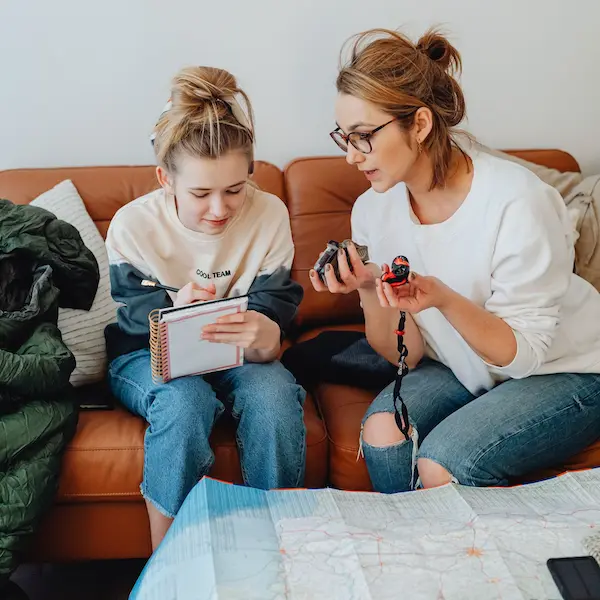
Towing Safety Tips
The question, "how to tow a travel trailer" should first be answered with one thought in mind: safety. The basics of towing a travel trailer aren't complete without such a discussion, so let's dig in! Towing a camper trailer can be dangerous if you're not prepared, and we're all about safety, preparedness, and mitigating risks to increase fun.
Here are some basic safety guidelines:
- Always use proper safety chains when towing.
- Check your mirrors frequently to make sure your trailer is still behind you.
- Using towing mirrors can greatly increase safety.
- Be aware of changing weather conditions, and adjust your speed and driving accordingly.
- Don't over-pack your trailer. Make sure the weight is evenly distributed to avoid problems when turning or braking.
- Take breaks frequently when driving long distances. Towing a travel trailer can be tiring!
- Tire pressure matters! Make sure you follow the manufacturer's guidelines for both your passenger vehicle AND your trailer in order to correctly adjust tire pressure when towing a travel trailer.
- Get your vehicle and trailer serviced before a long trip. This includes checking fluid levels, brakes, and tires.
- Practice driving with your trailer in an empty parking lot to get a feel for how it handles.
- Be extra cautious when passing other vehicles, as they may not be able to see your trailer.
- In bad weather, it's best to avoid driving if possible. If you must drive, go slowly and be extra careful. Again, Highway Weather can help you plan ahead and strategically avoid poor driving conditions!
Blind Spot Safety Tips
Be aware of blind spots! Just because you can see the cars around you doesn't mean they can see you - and especially vice versa. Towing anything from a full-sized camper caravan to a small teardrop or mini trailer can greatly impede your field of vision and increase the number of blind spots you wouldn't otherwise have. So stay alert, use your mirrors (and mirror extensions if you have them), and give yourself (and other drivers) plenty of time to react.
Additionally, it's always a good idea to use hand signals when changing lanes with a trailer. This will alert other drivers of your intentions and help them be aware of your blind spots.
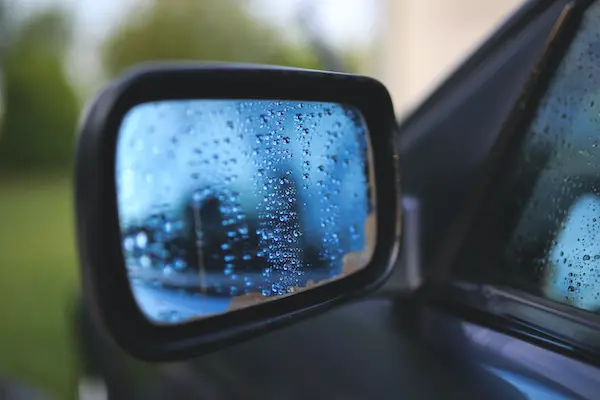
Braking While Towing a Camper Trailer
Take a moment to think about a vehicle towing a caravan at 55 miles per hour. Now, factor in the additional weight of that trailer, and you can see how stopping becomes a bit more complicated, and quite simply difficult. The bottom line is that it takes longer to stop when towing a trailer - so always give yourself plenty of time and space to brake.
A good rule of thumb is to increase your following distance by at least two car lengths when towing. This will give you plenty of time to brake if necessary, and it's always better to err on the side of caution!
Additionally, be sure to test your brakes frequently when towing a trailer - especially on long trips. This will help ensure that they are in good working condition and can handle the additional weight.
Towing a Travel Trailer in Snow
If you're planning on towing your travel trailer in snow, there are a few things you need to keep in mind. First, it's important to know that not all vehicles are equipped to tow in snowy conditions. If you're unsure about whether or not your vehicle can handle towing in snow, we recommend checking with the manufacturer.
Next, you need to make sure your trailer is properly winterized. This includes things like adding antifreeze to your pipes and making sure your tires are in good condition.
Lastly, it's important to drive slowly and carefully when towing in snow. Be aware and cautious of other vehicles and obstacles on the road, and give yourself plenty of time to brake.
Towing a Travel Trailer in the Mountains
If you're planning to tow your travel trailer in the mountains, there are a few things to bear in mind. Not all vehicles are equipped to tow in mountainous conditions. You're going to be ascending and descending some pretty steep gradients, to it's essential to confirm that both the towing vehicle and trailer are capable of making the journey.
Once again, if you're unsure about whether or not your vehicle can handle towing in the mountains, we recommend checking with the manufacturer.
Not unlike driving in snowy or icy conditions, it's important to drive slowly and carefully when towing in the mountains. Be extra cautious of other vehicles and obstacles on the road, and give yourself plenty of time to brake.
Towing a Travel Trailer at Night
In all likelihood, you're going to be traveling with your camper trailer at night. That's a lot of valuable cargo to be rolling on the road in darkness, so make sure you're well prepared. First, it's important to make sure your trailer is properly lit. This includes things like making sure your brake lights and turn signals are working correctly.
Next, you need to be extra cautious of other vehicles on the road. Pay attention to their headlights and taillights, and be prepared to brake if necessary.
In case of any breakdowns or unplanned-but-necessary stops at night, you'll want to be ready for just about anything. That means packing things like a flashlight, flares, and reflective triangles. It's also a good idea to have a plan for where you're going to stop in case of an emergency.
Towing a Travel Trailer on the Highway
Traveling on the highway in the best of conditions can sometimes be scary. While fear shouldn't ruin your journey, you'll want to be extra cautious when towing a caravan. First, it's important to stay in the right lane as much as possible. The left lane is for passing only, and you don't want to block traffic by driving too slowly.
As we've already discussed, because of the significant length and weight of your vehicle + trailer in tow, you'll naturally drive more slowly, but also, your breaking distance will be elongated. Simple but impactful physics! So, always give yourself plenty of time and space to brake.
Additionally, be extra courteous when passing other vehicles, as they may not be able to see your trailer.
Towing a Travel Trailer in Windy Conditions
Windy conditions can be a challenge when towing a travel trailer. High winds can make it difficult to keep your vehicle and trailer in a straight line, so it's important to be extra cautious when driving in windy conditions.
If possible, avoid towing in high winds. If you must tow in windy conditions, pay attention to weather reports and only travel during periods of low wind.
When towing in windy conditions, it's important to drive slowly and carefully. Be aware of other vehicles on the road, and be prepared to brake if necessary.
What Is Jackknifing a Trailer and How Do I Avoid It?
One of the most dangerous things that can happen when towing a travel trailer is jackknifing. This happens when the trailer swings out from behind the vehicle, and the two become perpendicular to each other. Jackknifing can be caused by braking too hard, or by taking a turn too sharply.
To avoid jackknifing, always brake slowly and keep a sharp eye on your mirrors to make sure your trailer is staying in line.
What Happens If My Camper Trailer Jackknifes?
If your trailer jackknifes, the best thing to do is to stay calm and slowly bring your vehicle to a stop. Once you're stopped, assess the situation and decide whether you can fix the problem yourself or if you need to call for help. If you're not sure what to do, it's always better to err on the side of caution and call for help.
What If I Have an Accident While Towing a Travel Trailer?
If you have an accident while towing a travel trailer, the first thing you should do is assess any injuries and get medical help if necessary. Once everyone is safe, you can start dealing with the damage to your vehicle and trailer. If possible, move your vehicle and trailer off to the side of the road to avoid blocking traffic. Then, you can call your insurance company and start the claims process.
Towing a travel trailer can be a fun and rewarding experience - but it's important to be prepared! By following the tips in this article, you can help ensure a safe and enjoyable trip for everyone involved.
Now, let's get to the more positive stuff - packing!
Packing For Your Trip
Now that you know the basics of towing a travel trailer, it's time to start packing for your trip.
Packing for a trip can be overwhelming, but if you take it one step at a time, it's not so bad. Start by making a list of all planned activities, and then make a packing list for each activity. Additionally, it can be a good idea to organize boxes or bags by activity. This will make it easier to find everything when you're unpacking at your destination.
If you're bringing along any perishable items, be sure to pack them in a cooler with ice packs. And don't forget the sunscreen! No one wants to spend their vacation recovering from a sunburn.
Remember, you'll need to pack for both your vehicle and your travel trailer. Once you've got everything packed up, you're ready to hit the road.
While by no means an extensive list, here are some essential items you'll need to bring along:
- Towels and linens
- Cooking utensils and dishes
- Food and drinks
- Clothing
- Toiletries
- First-aid kit
- Games and toys
- Camera
Packing for your trip doesn't have to be a daunting task. By following these tips, you can make it a little easier, and you'll certainly thank yourself once you reach your destination.
Speaking of...
Arriving at Your Campsite
After a long day of driving, you've finally arrived at your campsite. Now it's time to get set up and start enjoying your vacation.
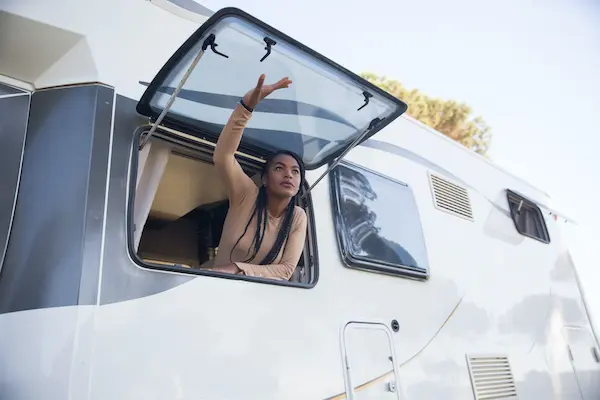
If you're not already familiar with the area, take a few minutes to explore and get your bearings. Once you know where you are, it's time to start setting up camp.
If you're camping in an RV park, there will likely be designated spots for each camper. If you're dry camping or boondocking, you'll need to find a level spot to set up your RV. Once you've found the perfect spot, it's time to start setting up camp.
If you have a generator, now is the time to start it up and get it running. This will provide power for any electric items you need to use, like lights or a coffee maker. If you don't have a generator, you'll need to be more selective about which electric items you use, as you'll be limited by the power of your battery.
Once you have power, it's time to start setting up your caravan. If you have an awning, now is the time to put it up. You can also start bringing in any chairs or table you plan to use. If you have a campfire, now is the time to get it going. And if you're planning to cook any meals, now is the time to start prepping.
After you've got everything set up, it's time to sit back and relax. Enjoy the peace and quiet of nature, and don't forget to take some photos! You're sure to have a memorable trip.
There's a lot of challenging safety and planning aspects to towing a caravan, but with proper forethought, the right tools, and a great, patient attitude on the road, it can be an incredibly fulfilling, fun adventure! Follow these tips to make sure you're as prepared as possible, and you'll be well on your way to a safe and enjoyable trip.
Do you have more suggestions about towing a camper trailer? Connect with us on Facebook, Instagram, or Twitter, and share them!






